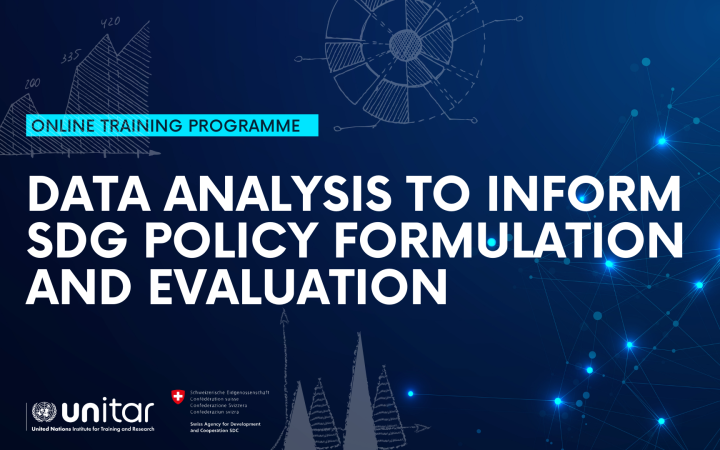On the 20th of December 2022, UNITAR launched its latest initiative, the "Data analysis to inform SDG formulation and evaluation" programme. Tailored for public officials overseeing planning and evaluation, researchers seeking to delve into public policy evaluation, evaluators aiming to enhance their quantitative skills, and professionals requiring strengthened statistical and causal inference abilities, the programme stands as a comprehensive online training opportunity.
This innovative programme is UNITAR's response to the growing demand from national stakeholders for learning opportunities in data analysis. Specifically geared towards informing the formulation and evaluation of public policies aligned with sustainable development goals, the curriculum not only covers descriptive analysis but places a distinct focus on causal inference. This emphasis stems from insights gleaned through a global survey conducted by UNITAR in 2020, pinpointing learning gaps that needed addressing.
The programme encompasses both theoretical concepts and practical applications, utilizing two widely used statistical software (R and Stata). Beginning with fundamental topics in statistical analysis, the course covers exploratory data analysis, descriptive statistics, and data visualization. It then progresses to delve into causal inference, exploring well-known models like matching techniques, regression discontinuity, instrumental variables study, and difference-in-differences.
A total of 392 applications were received, and after a rigorous selection process, 104 participants from 59 countries were accepted for the first edition of the programme. Representing diverse constituencies, these participants embodied the intended audience of public officials, researchers, and evaluators.
Running for a span of two months, from January 9th to February 28th, 2023, the programme was crafted as a blend of self-paced e-learning activities, peer exchange, and team-based project design. Online workshops facilitated by a course instructor ensured personalized feedback, while tutoring on statistical software, such as R, aided participants in completing team assignments.
Feedback from participants attested to the programme's efficacy, with 93% noting its relevance to their work and an impressive 98% deeming it useful. Significantly, 92% expressed a clear intent to apply the acquired knowledge and skills in their professional endeavours. The overwhelmingly positive response extended to the future, with 93% of participants indicating interest in a follow-up programme, particularly one focused on public policy evaluation with quantitative and mixed-mode methods.


